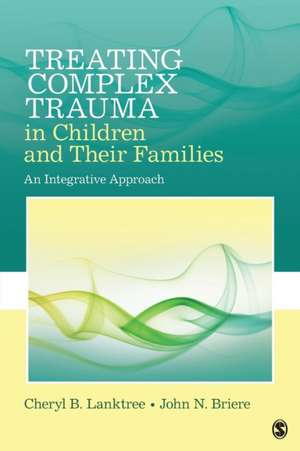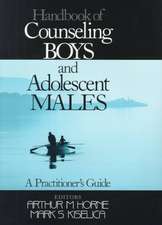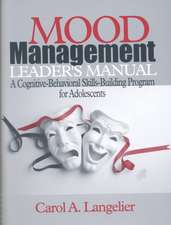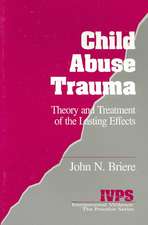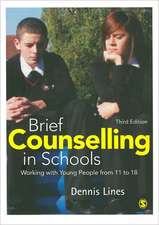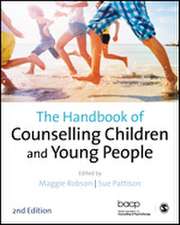Treating Complex Trauma in Children and Their Families: An Integrative Approach
Autor Cheryl B. Lanktree, John N. Briereen Limba Engleză Paperback – 15 mar 2016
Preț: 605.37 lei
Preț vechi: 680.19 lei
-11% Nou
Puncte Express: 908
Preț estimativ în valută:
115.83€ • 121.38$ • 95.76£
115.83€ • 121.38$ • 95.76£
Carte disponibilă
Livrare economică 21 martie-04 aprilie
Preluare comenzi: 021 569.72.76
Specificații
ISBN-13: 9781452282640
ISBN-10: 1452282641
Pagini: 296
Dimensiuni: 152 x 229 x 22 mm
Greutate: 0.39 kg
Ediția:1
Editura: SAGE Publications
Colecția Sage Publications, Inc
Locul publicării:Thousand Oaks, United States
ISBN-10: 1452282641
Pagini: 296
Dimensiuni: 152 x 229 x 22 mm
Greutate: 0.39 kg
Ediția:1
Editura: SAGE Publications
Colecția Sage Publications, Inc
Locul publicării:Thousand Oaks, United States
Recenzii
“This is a must-read for clinicians who help traumatized children and their families. Lanktree and Briere have developed and tested an accessible, integrated, assessment-driven model that recognizes the significant impact of trauma on young children in different social contexts. A valuable alternative to rigidly manualized treatments, this book relies on clinical judgment and customized planning.”
“Once again, the brilliance of the Lanktree and Briere team has been demonstrated. The comprehensive nature and depth of this challenging topic is thoughtfully and creatively illustrated. The cultural/marginalization perspective is unparalleled within the topic of complex trauma. This text is a must read for both my undergraduate and graduate trauma-focused courses.”
“An indispensable, practical guide for every therapist working with children and families who have been exposed to complex trauma. The treatment model is truly integrative in incorporating the authors’ extensive experience, sophisticated clinical sensitivity, and broad knowledge of the evidence-informed approaches to psychotherapy, and their deep understanding of the challenges facing children and families who are recovering from complex trauma.”
“Relevant, timely, and essential for all disciplines working to effectively and affectively help children. This book provides the theory underlining how to begin the healing process with children while demonstrating sensitivity and clarity as one proceeds with specific steps towards that healing.”
“A wonderful integrative approach for students to learn how to work with both child who have experience trauma as well as families.”
“Once again, the brilliance of the Lanktree and Briere team has been demonstrated. The comprehensive nature and depth of this challenging topic is thoughtfully and creatively illustrated. The cultural/marginalization perspective is unparalleled within the topic of complex trauma. This text is a must read for both my undergraduate and graduate trauma-focused courses.”
“An indispensable, practical guide for every therapist working with children and families who have been exposed to complex trauma. The treatment model is truly integrative in incorporating the authors’ extensive experience, sophisticated clinical sensitivity, and broad knowledge of the evidence-informed approaches to psychotherapy, and their deep understanding of the challenges facing children and families who are recovering from complex trauma.”
“Relevant, timely, and essential for all disciplines working to effectively and affectively help children. This book provides the theory underlining how to begin the healing process with children while demonstrating sensitivity and clarity as one proceeds with specific steps towards that healing.”
“A wonderful integrative approach for students to learn how to work with both child who have experience trauma as well as families.”
Cuprins
Acknowledgments
About the Authors
Chapter 1: Introduction
Empirical Support for ITCT
Structure of This Book
Chapter 2: Effects of Complex Trauma in Children
Complex Posttraumatic Events
Effects of Complex Trauma
Phenomena That May Intensify, Compound, or Complicate Trauma Effects
Chapter 3: Central Aspects of ITCT-C
Assessment-Driven Treatment
Attention to Complex Trauma Issues
Early Focus on Immediate Issues
Focus on a Positive Working Relationship With the Therapist
Customization
Attention to Attachment Difficulties
Skills Development
Titrated Therapeutic Exposure and Exploration of Trauma Memories
A Flexible Time Frame
Advocacy and Interventions at the System Level
Positive Professional Collaborations and Therapist Self-Care
Chapter 4: Assessment of Complex Trauma
Background and Current Assessment Information
Assessment of Trauma Exposure
Evaluation of Trauma-Relevant Symptoms
Assessment Measures That Can Be Used in ITCT-C
Chapter 5: The Assessment-Treatment Flowchart for Children (ATF-C) and the Problems-to-Components Grid for Children (PCG-C)
The Assessment-Treatment Flowchart for Children
The Problems-to-Components Grid for Children (PCG-C)
Chapter 6: Characteristics and Tools of the Therapy Environment
The Therapy Office/Agency Environment
Session Consistency and Safety
Play Therapy Materials and Resources
Chapter 7: Relationship Building and Support
Expanding the Child’s Sense of Identity
Therapist Behaviors That Contribute to a Positive Therapeutic Relationship
Use of Play and Humor
The Role of Attachment History for the Therapist and the Client
Family Therapy, Group Therapy, and Advocacy to Enhance the Therapeutic Relationship
Advocacy and Case Management
Dealing With Difficult Client-Therapist Relationship Challenges
A Special Topic: Pet-Assisted Therapy or Sessions Involving Pets
Chapter 8: Safety Interventions
Impediments to Therapy
Reporting Suspected Child Abuse and Neglect
Ongoing Monitoring of Safety Issues and Interventions
Suicidality and Harmful Behavior Toward Others: Assessment and Interventions
Possible Safety Issues During Monitored Visits
Safety Within the Therapy Sessions
Chapter 9: Psychoeducation
General Focus of Psychoeducation
Books and Other Materials Used in ITCT-C
Other Approaches to Psychoeducation With Children
Psychoeducation With Caretakers
Chapter 10: Advocacy and Systems Interventions
Culture-Specific Advocacy
Advocacy for Economically Disadvantaged Clients
Advocacy as Therapy
Mental Health Advocacy and Support for Caretakers
Advocacy With Child Protection and Foster Care Systems
Court/Legal Systems Advocacy
School Collaborations and Advocacy
Chapter 11: Distress Reduction and Affect Regulation Training
Acute Distress Reduction
Emotional Regulation Capacity
Chapter 12: Facilitating Positive Identity
Resilience and Its Relationship to Self-Esteem
Specific Interventions to Enhance Positive Identity Development, Self-Efficacy, and Assertiveness
Chapter 13: Cognitive and Emotional Processing
Preconditions for Emotional Processing When Addressing Complex Trauma
Cognitive Processing
Emotional Processing
Chapter 14: Relational/Attachment Processing
Specific Client Attachment Styles
Avoidant Attachment
Resistant/Preoccupied/Ambivalent Attachment
Disorganized Attachment
Assessment of Attachment Disturbance
Relational Processing of Complex Trauma Effects
Conclusions
Chapter 15: Interventions With Caretakers
ITCT-C Caretaker Interventions: Multiple Modalities
Individual Psychotherapy With Caretakers
Couple’s Sessions
Conjoint/Dyadic Caretaker-Child Interventions
Support, Education, and Parenting Skills
The Caretaker Support Group Module
Follow-Up Group
Chapter 16: Family Therapy
Who to Include in Family Therapy Sessions?
Cultural Factors to Consider
When Should Family Therapy Be Considered?
What Improves the Likelihood of Effective Family Therapy?
Impacts of Systems Issues on Families
Family Therapy Interventions
ITCT-C Family Therapy Module for Sessions
Chapter 17: School-Based Adaptation of ITCT-C
School-Based ITCT-C Interventions
The ITCT-C School-Based Group Model
Chapter 18: Supervision and Therapist Self-Care
Common Reactions and Feelings in Therapists Working in the Trauma Field
Supervision and Consultation
Team-Building and Support
Further Training and Professional Development
Personal Therapy
Developing a Mindful Perspective
Self-Care
Appendix
References
Index
About the Authors
Chapter 1: Introduction
Empirical Support for ITCT
Structure of This Book
Chapter 2: Effects of Complex Trauma in Children
Complex Posttraumatic Events
Effects of Complex Trauma
Phenomena That May Intensify, Compound, or Complicate Trauma Effects
Chapter 3: Central Aspects of ITCT-C
Assessment-Driven Treatment
Attention to Complex Trauma Issues
Early Focus on Immediate Issues
Focus on a Positive Working Relationship With the Therapist
Customization
Attention to Attachment Difficulties
Skills Development
Titrated Therapeutic Exposure and Exploration of Trauma Memories
A Flexible Time Frame
Advocacy and Interventions at the System Level
Positive Professional Collaborations and Therapist Self-Care
Chapter 4: Assessment of Complex Trauma
Background and Current Assessment Information
Assessment of Trauma Exposure
Evaluation of Trauma-Relevant Symptoms
Assessment Measures That Can Be Used in ITCT-C
Chapter 5: The Assessment-Treatment Flowchart for Children (ATF-C) and the Problems-to-Components Grid for Children (PCG-C)
The Assessment-Treatment Flowchart for Children
The Problems-to-Components Grid for Children (PCG-C)
Chapter 6: Characteristics and Tools of the Therapy Environment
The Therapy Office/Agency Environment
Session Consistency and Safety
Play Therapy Materials and Resources
Chapter 7: Relationship Building and Support
Expanding the Child’s Sense of Identity
Therapist Behaviors That Contribute to a Positive Therapeutic Relationship
Use of Play and Humor
The Role of Attachment History for the Therapist and the Client
Family Therapy, Group Therapy, and Advocacy to Enhance the Therapeutic Relationship
Advocacy and Case Management
Dealing With Difficult Client-Therapist Relationship Challenges
A Special Topic: Pet-Assisted Therapy or Sessions Involving Pets
Chapter 8: Safety Interventions
Impediments to Therapy
Reporting Suspected Child Abuse and Neglect
Ongoing Monitoring of Safety Issues and Interventions
Suicidality and Harmful Behavior Toward Others: Assessment and Interventions
Possible Safety Issues During Monitored Visits
Safety Within the Therapy Sessions
Chapter 9: Psychoeducation
General Focus of Psychoeducation
Books and Other Materials Used in ITCT-C
Other Approaches to Psychoeducation With Children
Psychoeducation With Caretakers
Chapter 10: Advocacy and Systems Interventions
Culture-Specific Advocacy
Advocacy for Economically Disadvantaged Clients
Advocacy as Therapy
Mental Health Advocacy and Support for Caretakers
Advocacy With Child Protection and Foster Care Systems
Court/Legal Systems Advocacy
School Collaborations and Advocacy
Chapter 11: Distress Reduction and Affect Regulation Training
Acute Distress Reduction
Emotional Regulation Capacity
Chapter 12: Facilitating Positive Identity
Resilience and Its Relationship to Self-Esteem
Specific Interventions to Enhance Positive Identity Development, Self-Efficacy, and Assertiveness
Chapter 13: Cognitive and Emotional Processing
Preconditions for Emotional Processing When Addressing Complex Trauma
Cognitive Processing
Emotional Processing
Chapter 14: Relational/Attachment Processing
Specific Client Attachment Styles
Avoidant Attachment
Resistant/Preoccupied/Ambivalent Attachment
Disorganized Attachment
Assessment of Attachment Disturbance
Relational Processing of Complex Trauma Effects
Conclusions
Chapter 15: Interventions With Caretakers
ITCT-C Caretaker Interventions: Multiple Modalities
Individual Psychotherapy With Caretakers
Couple’s Sessions
Conjoint/Dyadic Caretaker-Child Interventions
Support, Education, and Parenting Skills
The Caretaker Support Group Module
Follow-Up Group
Chapter 16: Family Therapy
Who to Include in Family Therapy Sessions?
Cultural Factors to Consider
When Should Family Therapy Be Considered?
What Improves the Likelihood of Effective Family Therapy?
Impacts of Systems Issues on Families
Family Therapy Interventions
ITCT-C Family Therapy Module for Sessions
Chapter 17: School-Based Adaptation of ITCT-C
School-Based ITCT-C Interventions
The ITCT-C School-Based Group Model
Chapter 18: Supervision and Therapist Self-Care
Common Reactions and Feelings in Therapists Working in the Trauma Field
Supervision and Consultation
Team-Building and Support
Further Training and Professional Development
Personal Therapy
Developing a Mindful Perspective
Self-Care
Appendix
References
Index
Notă biografică
Descriere
This is one of the few books on the treatment of psychological trauma in children that provides in-depth individual, group, and family therapy interventions for complex psychological trauma.
